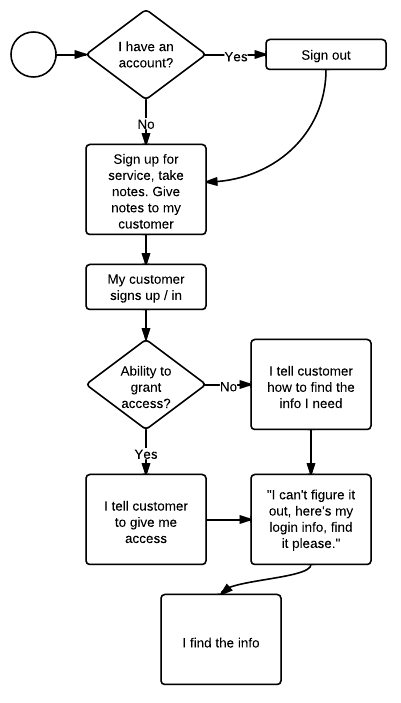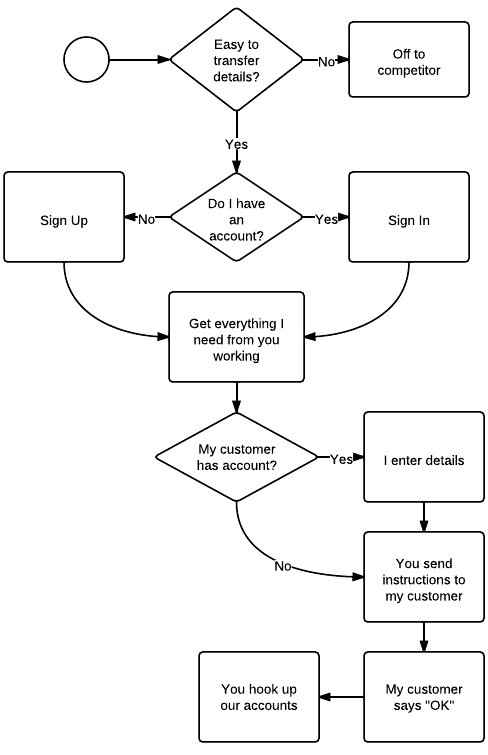Most online developer API services that I've used are set up as if the customer is also the software developer.
That should change.
As the software developer, I don't want to be the owner of my customer's accounts, and I don't
want to worry about trying to figure out how to transfer ownership (if your service allows it, that is).
Because of that, theres a lot of waste that goes on: wastes of my time,
which wastes my customer's or my company's money.
I'm saying "customer" here, but you might substitute that with "the person who really needs / cares about the account,"
because that person, in my estimation, is rarely the software developer. Unless I'm developing an app for myself,
I only care about that API because someone else needs me to. And even when I'm developing for myself, I hope it gets to
a point where I need to hire someone to care about it on my behalf, so I can focus on more important things.
The typical signup process for me goes like this:

- Me: If I already have an account, sign out.
- Me: Sign up for the service. Find what I need to integrate with the API. Note the steps I perform.
- Customer: Signs up for the service, with me providing the steps they'll need to take.
- Me: Ask my customer to give me the info I need, or grant me access if that option is available.
- Customer: "I can't figure it out, here's my login info, find it please."
- Me: I find the info, and tell the customer to reset their password. I doubt they ever do.
You're offering the service, yet there's no "you" in that process.
Here's the process I'd like to see:

- You: Tell me I can easily transfer the account (or project or access keys) before I bother to sign up
- Me: Sign up for an account for myself.
- Me: Get everything working.
- Me and You: If I know my customer already has an account, provide a place for me to enter my customer's email address. If you offer more than one thing I'll need access to, let me indicate what I need for this project.
- You: Send detailed instructions of to grant access to my needs.
- You: If my customer does not have an account, you send them detailed instructions for how to sign up and what they'll need to know to get value from your service.
- Customer: signs up for their account, indicating they are actually working with me.
- You: Hook up our accounts, with me transferring ownership of that "project" to my customer.
There's a lot less of me and my customer in that process, and a lot more of you.
It's certainly more complex, but it's simpler for the people who matter: your users.
Remember, the software developer is often the one who makes recommendations as to which products to use. Make
it easier for me, and I'll be more likely to choose your service over a competing one.
post scriptum side note: I used Lucid Chart to do the flow charts. I really
like it, but given how rarely I've wanted to diagram online, I don't see myself becoming a paid
subscriber. What do you use?
Hey! Why don't you make your life easier and subscribe to the full post
or short blurb RSS feed? I'm so confident you'll love my smelly pasta plate
wisdom that I'm offering a no-strings-attached, lifetime money back guarantee!
Leave a comment
Hi Sam,
we're completely with you!
I'm working on an API marketplace called "Mashape" which will have permissions for each API (like github does) so that you can manage multiple access.
Will love to get your feedbacks on this, once ready.
cheers,
aghi
Posted by
sinzone
on Jan 27, 2012 at 06:53 AM UTC - 6 hrs
Cool! In fact I was wondering to myself if there's a business to be made out of helping you manage this stuff, but I didn't put enough thought behind it to get anywhere.
http://www.mashape.com/ looks pretty cool. Now that I think about it, I wonder if this is related to what
http://apigee.com/ does? I haven't looked into it aside from their home page, which isn't all that helpful in explaining to me what they do.
Anyway, I'd like to explore when you guys are ready (and when I make some time).
If you don't mind my asking -- do you have plans to monetize it already? And if so, are you thinking on the publisher or consumer side? (or both?)
Posted by
Sammy Larbi
on Jan 27, 2012 at 07:27 AM UTC - 6 hrs
This is definitely how it ought to be everywhere. Well said.
Posted by Jim Gay
on Jan 27, 2012 at 08:21 AM UTC - 6 hrs
Yes.
Do you have an email, where I can explain you these stuff privately?
thx
a
Posted by
sinzone
on Jan 27, 2012 at 08:54 AM UTC - 6 hrs
Tell me about it!
The easiest thing, which I try to do, is to set up a generic email address at the client's end do I can sign them up away from anyone named individual, either with my company or theirs.
Posted by
Adrian Lynch
on Feb 16, 2012 at 09:21 AM UTC - 6 hrs
I do the same thing if there's a bunch of new accounts to do, like right now I've been working on supporting a bunch of different payment gateways, so I asked them to set me up an accounts@example.com address to use for all of them, which they can just change the password on when we're done.
Posted by
Sammy Larbi
on Feb 16, 2012 at 10:35 AM UTC - 6 hrs